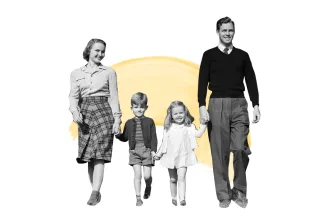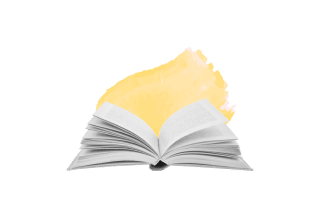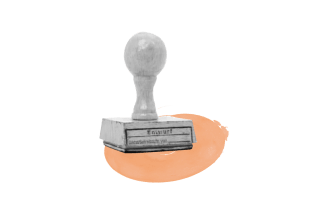Name Directory by Last Name: Last Names Starting with Da
Explore millions of names to discover rich genealogical details and uncover your family's history
Enter a name to research
Last name meanings and origins
- Davis
The surname Davis has its historical roots in the patronymic tradition, deriving from the given name David, which itself has Hebrew origins meaning "beloved." The surname first appeared in England during the medieval period, particularly after the Norman Conquest of 1066, when the use of surnames became more common. As a patronymic surname, Davis indicates "son of David," and it was often associated with individuals who held significant social roles, such as landowners or clergy.
- Davies
The surname Davies has its historical roots in Wales, deriving from the given name David, which itself comes from the Hebrew name "Dawid," meaning "beloved." The surname first appeared in written records in the 13th century, with its usage becoming more widespread in the following centuries. As a patronymic surname, Davies signifies "son of David," reflecting the common practice in Welsh culture of forming surnames based on the father's name.
- Day
The surname Day has its historical roots in the Old English word "dæg," meaning "day" or "daylight." It first appeared in England during the medieval period, with records dating back to the 13th century. The name likely originated as a nickname for someone born during the day or as a reference to a person’s character, possibly denoting brightness or cheerfulness.
- Davidson
The surname Davidson has its historical roots in Scotland, deriving from the given name "David," which itself comes from the Hebrew name "Dawid," meaning "beloved." The name became popular in medieval Scotland, particularly after the reign of King David I in the 12th century, who was instrumental in the development of the Scottish church and the feudal system. The surname Davidson is often associated with the clan system in Scotland, where it was used to denote "son of David," reflecting a patronymic tradition.
- Dawson
The surname Dawson has its historical roots in England, deriving from the medieval given name "Daw," which itself is a diminutive of David. The name David has Hebrew origins, meaning "beloved," and was popularized in Christian contexts due to its biblical associations.
- Daniels
The surname Daniels has its historical roots in the Hebrew name "Daniel," which means "God is my judge." It first appeared in England during the medieval period, particularly after the Norman Conquest of 1066, when many Hebrew names were adopted by English speakers. The surname likely developed as a patronymic, indicating "son of Daniel," and was associated with individuals who held various occupations, including clerical roles, as the name was often linked to those in religious or scholarly positions.
- David
The surname David has deep historical roots, tracing back to the Hebrew name "Dawid," which means "beloved." It is most famously associated with the biblical King David, a central figure in Jewish, Christian, and Islamic traditions, who ruled over Israel around 1000 BCE. The name gained prominence in medieval Europe, particularly among Jewish communities, where it symbolized a connection to heritage and faith.
- Daniel
The surname Daniel has deep historical roots, tracing back to the Hebrew name "Daniyyel," which means "God is my judge." It first appeared in biblical texts, notably in the Book of Daniel, where the character is known for his wisdom and prophetic abilities. Over time, the name evolved into various forms across different cultures, particularly in Europe, where it became popularized during the Middle Ages.
- Davenport
The surname Davenport has its historical roots in England, specifically deriving from the Old English elements "dæge," meaning "day," and "port," meaning "a harbor or town." The name is believed to have originated from the village of Davenport in Cheshire, where it first appeared in records during the 13th century. Over time, the surname became associated with various occupations, particularly those linked to trade and commerce, as ports were vital for economic activity.
- Daly
The surname Daly has its roots in Ireland, deriving from the Gaelic name "Ó Dálaigh," which means "descendant of Dálach." The name Dálach itself is believed to be derived from the word "dál," meaning "assembly" or "meeting," suggesting a historical connection to a group or community. The surname first appeared in historical records in the 12th century, particularly in the province of Connacht, where the Ó Dálaigh family was known as poets and historians.
- Dalton
The surname Dalton has its roots in England, deriving from the Old English elements "dæl," meaning "valley," and "tun," meaning "enclosure" or "settlement." This suggests that the name originally referred to someone who lived in or near a valley settlement. The earliest recorded instances of the surname date back to the 12th century, with variations appearing in historical documents, such as "Daleton" and "Daltone." Over time, the surname became associated with various occupations, particularly in agriculture, as many bearers of the name were likely involved in farming or land management in the fertile valleys of England.
- Dale
The surname Dale has its origins in the Old English word "dael," meaning "valley." It first appeared in England during the early medieval period, particularly in regions characterized by valleys and low-lying areas. The name was often used to denote individuals who lived near or in a dale, reflecting the geographical features of their surroundings.
- Davison
The surname Davison has its historical roots in England, deriving from the medieval given name "David," which itself comes from the Hebrew name "Dawid," meaning "beloved." The suffix "-son" indicates "son of," thus Davison essentially means "son of David." The surname first appeared in written records in the 13th century, particularly in the northern regions of England, where patronymic naming conventions were common. Over time, individuals bearing the surname often engaged in various occupations, including farming and trades, reflecting the agrarian society of medieval England.
- Da Silva
The surname Da Silva has its roots in the Iberian Peninsula, particularly in Portugal and Spain, where it first appeared in the medieval period. The name is derived from the Latin word "silva," meaning "forest" or "wood," and was often used to denote someone who lived near or worked in a forested area.
- Darling
The surname Darling has its roots in the Old English term "deorling," which translates to "darling" or "beloved." This term was often used as a term of endearment, suggesting that the name may have originally been a nickname for someone who was cherished or held in high regard. The surname first appeared in written records in England during the medieval period, with its earliest instances found in the 13th century.
- Daley
The surname Daley has its roots in Ireland, deriving from the Gaelic name "Ó Dálaigh," which means "descendant of Dálach." The name Dálach itself is believed to be derived from the word "dál," meaning "assembly" or "meeting," suggesting a historical connection to a group or community. The Daley surname first appeared in the 11th century, primarily in the province of Munster, where it was associated with the ancient Gaelic nobility.
- Dahl
The surname Dahl has its roots in Scandinavia, particularly in Norway and Sweden, where it is derived from the Old Norse word "dalr," meaning "valley." This geographical connection suggests that the name was originally used to describe individuals who lived in or near a valley, reflecting the topography of the region. The surname began to appear in written records as early as the Middle Ages, with its bearers often associated with agrarian lifestyles, as valleys were typically fertile areas suitable for farming.
- Daugherty
The surname Daugherty has its historical roots primarily in Ireland, deriving from the Gaelic name "O'Dochartaigh," which means "descendant of Dochartaigh." The name Dochartaigh is believed to be derived from the word "dochartach," meaning "hurtful" or "obstructive," suggesting that the original bearers of the name may have been known for their strong or combative nature. The Daugherty family is historically associated with County Donegal, where they were part of the Gaelic nobility.
- Davey
The surname Davey has its historical roots in the medieval period, primarily deriving from the given name "David," which itself has Hebrew origins meaning "beloved." The surname first appeared in England and Wales, with records dating back to the 13th century. As a patronymic surname, it often indicated lineage, meaning "son of David." Over time, the name became associated with various occupations, particularly in agriculture and trade, as many bearers of the surname were involved in farming or local commerce.
- Dailey
The surname Dailey has its historical roots primarily in Ireland, deriving from the Gaelic name "O'Dubhghaill," which means "descendant of Dubhghall." The name Dubhghall itself translates to "dark foreigner," a term that was historically used to describe Norse settlers in Ireland. The Dailey surname first appeared in historical records in the 12th century, particularly in the province of Munster.
- Darby
The surname Darby has its historical roots in England, with origins tracing back to the Old Norse name "Darby," which is derived from the place name "Derby." The name itself is believed to mean "deer town," reflecting the area's historical association with deer hunting and its natural landscape. The earliest recorded instances of the surname date back to the 12th century, particularly in the Derbyshire region.
- Darnell
The surname Darnell has its historical roots in England, with its earliest appearances dating back to the medieval period. The name is believed to derive from the Old French word "darnel," which refers to a type of grass that is often considered a weed.
- Dana
The surname Dana has historical roots that can be traced back to various cultures, with its origins primarily found in Hebrew and Slavic contexts. In Hebrew, "Dana" is often associated with the meaning "God is my judge," reflecting a spiritual or religious significance.
- Davy
The surname Davy has its historical roots primarily in England and France, deriving from the given name "David," which itself comes from the Hebrew name "Dawid," meaning "beloved." The surname began to appear in written records during the medieval period, particularly in the 12th century, as surnames became more common for identification purposes. Initially, it was often associated with individuals who were either named David or who were descendants of someone named David.
- Damon
The surname Damon has its roots in ancient Greece, deriving from the Greek name "Damon," which means "to tame" or "subdue." The name is historically associated with the concept of loyalty and friendship, most famously exemplified by the story of Damon and Pythias, two characters from a tale by the philosopher Plato that symbolizes unwavering loyalty and sacrifice. The surname likely emerged in the classical period and has been carried through generations, often linked to individuals who were seen as trustworthy or honorable.
- Danielson
The surname Danielson has its roots in the patronymic tradition, deriving from the given name Daniel, which is of Hebrew origin, meaning "God is my judge." This surname first appeared in various forms in medieval Europe, particularly in England and Scandinavia, where the suffix "-son" indicates "son of." The name Daniel itself gained popularity due to biblical references, particularly the Book of Daniel, which contributed to its widespread use among Christian communities. Over time, Danielson became associated with various occupations, often linked to farming or trades, as many surnames were derived from the professions of the bearers or their ancestors.
- Dawes
The surname Dawes has its historical roots in England, with its earliest appearances dating back to the medieval period. It is derived from the given name "Daw," a diminutive of David, which means "beloved" in Hebrew.
- Dayton
The surname Dayton has its historical roots in England, with its earliest appearances dating back to the medieval period. The name is believed to derive from the Old English elements "daeg," meaning "day," and "tun," meaning "enclosure" or "settlement," suggesting a meaning akin to "settlement by the day" or "farmstead." This indicates that the original bearers of the surname may have been associated with agricultural activities or land ownership.
- Daigle
The surname Daigle has its roots in French heritage, particularly in the regions of Canada and the northeastern United States, where it is most commonly found today. The name is believed to derive from the Old French word "daigle," which means "a small fish" or "a young fish," possibly indicating a connection to fishing or aquatic environments.
- Danforth
The surname Danforth has its historical roots in England, particularly in the region of East Anglia. It is believed to have originated from the Old English elements "denu," meaning valley, and "ford," referring to a river crossing.
- Dawkins
The surname Dawkins has its historical roots in England, deriving from the medieval given name "Dawkin," which is a diminutive form of "David." The name David itself has Hebrew origins, meaning "beloved." The surname first appeared in written records in the 13th century, particularly in the West Midlands region of England. Over time, Dawkins evolved as a patronymic surname, indicating "son of Dawkin." Occupations associated with early bearers of the name may have included farming or trades common in rural England, reflecting the agrarian society of the time.
- Daily
The surname Daily has its roots in the English language, deriving from the Old English word "daeg," meaning "day." It is believed to have originated as a nickname for someone who was born on a Sunday or perhaps someone who was known for their cheerful disposition, akin to the brightness of day. The surname first appeared in historical records in the medieval period, with variations such as "Dey" and "Dailie" noted in different regions.
- Darrow
The surname Darrow has its historical roots in England, with its earliest appearances dating back to the medieval period. The name is believed to be derived from the Old English word "deor," meaning "animal" or "deer," combined with "wudu," meaning "wood," suggesting a geographical connection to wooded areas where deer were prevalent.
- Davie
The surname Davie has its historical roots primarily in Scotland, where it is derived from the given name "David," which itself comes from the Hebrew name "Dawid," meaning "beloved." The surname first appeared in the medieval period, with records indicating its use as early as the 12th century. As a patronymic surname, Davie signifies "son of David," and it was commonly associated with individuals who held various occupations, including farming and trades, reflecting the agrarian society of the time.
- Dalrymple
The surname Dalrymple has its origins in Scotland, specifically linked to the region of Ayrshire. The name is derived from the Gaelic "Dail Rìmhail," which translates to "the meadow by the river." The earliest recorded instances of the surname date back to the 13th century, with the Dalrymple family being prominent landowners in the area.
- Dane
The surname Dane has historical roots that can be traced back to the Old English and Old Norse languages, where it originally referred to someone from Denmark or a person of Danish descent. The name likely emerged during the Viking Age, around the 8th to 11th centuries, when Norse explorers and settlers began to establish themselves in various parts of Europe, particularly in England.
- Danielsson
The surname Danielsson has its historical roots in Scandinavia, particularly in Sweden, where it is derived from the given name Daniel, meaning "God is my judge" in Hebrew. The suffix "-sson" indicates "son of," which was a common patronymic naming convention in Nordic cultures.
- Danner
The surname Danner has its historical roots primarily in Germany, where it is believed to have originated as a topographic name for someone who lived near a "Danne," which refers to a low-lying area or a valley. The name may also derive from the Middle High German word "dannen," meaning "to dwell" or "to reside," indicating a connection to a specific geographical feature.
- Dallas
The surname Dallas has its historical roots in Scotland, particularly associated with the town of Dallas in Moray. The name is derived from the Gaelic "Dail Eas," which translates to "field by the waterfall," reflecting the geographical features of the area.
- Darcy
The surname Darcy has its roots in medieval France, deriving from the Old French personal name "D'Arcy," which means "from Arcy," a place in Normandy. The name first appeared in historical records in the 11th century, particularly after the Norman Conquest of England in 1066, when many Normans settled in England.
Start your family tree for free
Start by entering a few names and MyHeritage will do the rest, so you can make meaningful discoveries
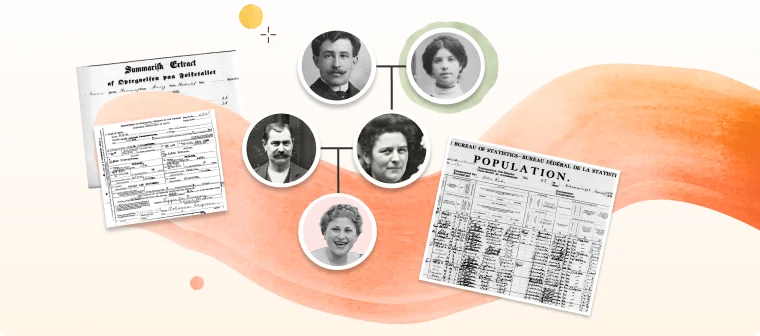
Explore historical records
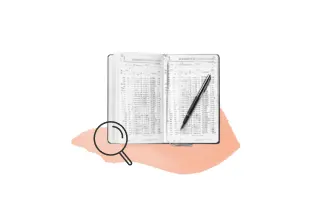
Explore 1,810,427,080 census and voter list records to get a detailed snapshot of your ancestors' lives. Discover names, ages, occupations, family relationships, residences, and much more.

Explore 4,647,704,406 birth, marriage, and death records. Uncover valuable details about major family milestones and find names, dates, places, occupations, and residences of your ancestors and relatives.

Search 266,544,192 military records and discover the stories of courage and resilience in your family history. Military records include enlistment dates, ranks, locations, and even physical descriptions.
Embark on a fascinating journey to discover your family history
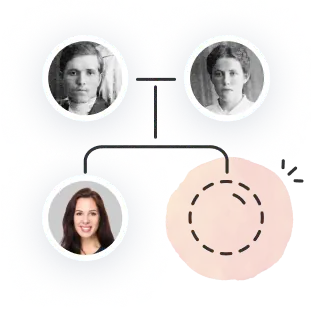
Start by adding a few names. Myheritage's automatic matching technology will help you expand your family tree and delight you with new discoveries.
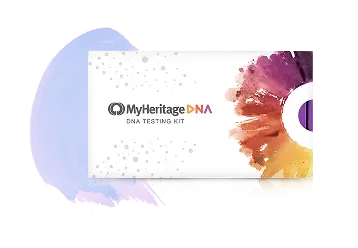
Reveal your ethnic origins and find relatives you never knew existed with our simple DNA kit.
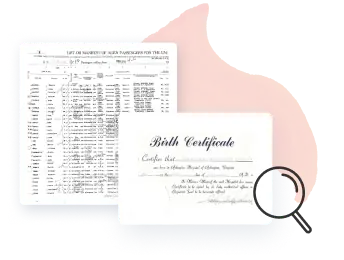
Dive into MyHeritage's international collection of 36.7 billion historical records - start with a name of an ancestor and see what our collections can reveal about your family history.
About MyHeritage

MyHeritage is the leading global platform for family history. It enriches the lives of people worldwide by enabling them to uncover more about themselves and where they belong. With a suite of intuitive products, billions of historical records, an affordable at-home DNA test, and AI-powered photo tools, MyHeritage creates a meaningful discovery experience that is deeply rewarding. The MyHeritage platform is enjoyed by tens of millions of people around the world who treasure and celebrate their heritage.

